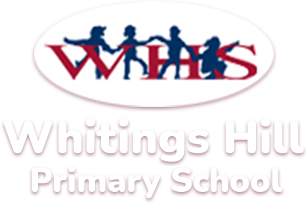Reading
The overarching aim for English in the national curriculum is to promote high standards of language and literacy by equipping pupils with a strong command of the spoken and written language, and to develop their love of literature through widespread reading for enjoyment.’
National Curriculum 2014
INTENT
At Whitings Hill Primary School, we aim to provide our children with an English Curriculum that is fun, motivating, interesting and most importantly purposeful. We strive to develop high standards of literacy through our stimulating and inspirational English Curriculum, where every child fosters a passion for English, has the opportunity to shine and achieves good outcomes. At Whitings Hill, our broad and rich English curriculum aims to ensure that all our children:
-
Read fluently and with good understanding
-
Develop the habit of reading widely and often, for both pleasure and information
-
Acquire a wide vocabulary, an understanding of grammar and knowledge of linguistic conventions for reading, writing and spoken language
-
Appreciate our rich and varied literary heritage
-
Use discussion in order to learn; they should be able to elaborate and explain clearly their understanding and ideas
-
Have access to a high quality English curriculum that is both challenging and enjoyable, based around, principally, high quality texts from ‘The Power of Reading’.
-
Are exposed to a variety of high quality reading materials & opportunities, which will enable them to develop as lifelong readers with a love of reading.
-
Have an enhanced vocabulary and use of standard English both written and orally
-
Are confident and independent readers
-
Are inquisitive readers who ask questions about the text – active learners. For example: Child response: “I think…, because…, In my opinion…, The writer…so that…, …led me to think that…”
-
Develop the reading skills needed to successfully research areas of personal interest
-
Feel supported when taking books to read at home
IMPLEMENTATION
At Whitings Hill we are outward looking and creative in our approach to implementing a high quality English curriculum. Our implementation is developed through secure understanding of the curriculum and subject area.
Planning for reading
1. Long term: National Curriculum and Development Matters
2. Medium term: Year group ‘Age Related Expectations’ information
Half termly coverage to include poetry, fiction & non-fiction texts and other high quality extracts
3. Short term: Year group ‘Age Related Expectation’ (ARE) formative and summative assessments
Teaching of reading
‘Quality first teaching’ linked to teaching standards:
All teachers:
1. Know where their children are, through the use of concise formative and summative assessment, including past SATs, prior learning assessments including phonic screening scores & Single Word Reading and Comprehension assessment. Also introducing the ‘Fluency Rubric’ in Year 6 enables practitioners to assess ‘Expression and Volume, Phrasing, Smoothness and Pace’.
2. Understand where their children need to be, through a secure understanding of year group expectations and/or pre key stage expectations also incisive, ongoing, formative assessment e.g. over the shoulder marking, adaptive questioning and the expectation of divergent responses to questions asked.
3. Know how they are going to get them there, through:
- The use of a wide range of strategies to promote independence, mastery and a love of reading, including using the VIPERS scheme (vocabulary, inference, prediction, explanation, retrieval, summary / sequencing).
- Plan three to four, 30 minute, teacher led, guided reading or whole-class reading sessions each week for KS1 and KS2, using a variety of high quality texts including: Fiction, Non-fiction, Newspapers, Magazines Reading Cards Extracts and any other sources. Literacy Shed and Love of Reading resources are also used.
- Plan daily phonic sessions in EYFS & KS1 based on Read, Write Inc. Children in KS2 that have not yet secured their phonic knowledge continue to learn using the Read, Write Inc scheme.
- Children are fluidly grouped according to their phonic attainment. The phonic teacher provides each child with a linked home reading book and an online matched phonics text.
- Make sure that KS2 children secure in their age related expectations for reading, follow the banded system, which includes a variety of fiction, non-fiction and poetry.
- Provide opportunities for theme based reading – including a range of fiction, non-fiction & poetry linked to class/phase theme.
- Use class books and children are modelled and read to by adults in the classroom
- Arrange Library sessions – each class has a designated time in the week to visit the school library – free choice readers.
To enhance learning, teachers will:
1. Effectively deploy adults, specifically during guided reading & phonics.
2. Plan for progression during and between sessions.
3. Use high quality questioning and teacher prompts
4. Encourage high level responses
5. Model Standard English
6. Use a range of subject specific vocabulary in context to extend children’s vocabulary
7. Model high expectations in order to scaffold learning and prompt independent learning
IMPACT
-
Because our book scheme is fully decodable, our children quickly gain confidence in reading
-
Due to the variation in our schemes and engaging English texts, children read a wide range of literature and appreciate our rich and varied literary heritage.
-
Children are able to access non-fiction text to develop their own learning and develop their cultural and spiritual experiences.
-
Children discuss our text with enthusiasm and develop a habit of reading for pleasure.
-
In the last recorded collection, data shows that at the end of KS2 85% of children reached the expected standard but we strive to do more.
